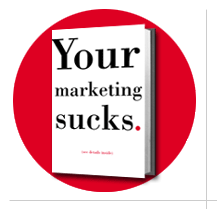How do you define what marketing "sucks" and what marketing is "effective?"
It's really much much simpler than the marketing gurus, B school professors and big agencies will have you believe: marketing that generates a reasonable return on investment is effective; marketing that does not, SUCKS.
Is it really that simple?
Yes, but so much gobbledygook have been thrown into the mix — in great measure to camouflage failure — that the issue appears to be cloudy. But it doesn't have to be.
Think of it this way: imagine you own a local grocery store that registers sales of $250,000 a year. A consultant or an agency suggests you allocate $20,000 to promotions in order to grow your business. If that marketing doesn't account for incremental revenue of $20,001 (or hopefully much more), it sucks.
Here is the key point: if the $20,000 produce $15,000 in new business, you have lost $5,000. All too often that is the case. Which why I say "most marketing is like tossing thousand dollar bills out the window."
You say "most." Given that there are many smart people involved in marketing, why does it fall short of the mark so often?
Many reasons. None more critical than the fact that marketers often forget the most important axiom in business: IBM founder Tom Watson's statement that "nothing happens unless a sale is made".
What does "selling" have to do with marketing?
Just about everything, and that is what so many of these "smart" marketers forget. To be precise, they forget that their efforts have to result in people getting in their cars or logging on to the Internet, finding a product or service they've been alerted to and purchasing it. If that doesn't happen, the grocery doesn't grow, GM doesn't grow, and the dollars keep flying out the window.
How can marketers be more effective at growing sales?
They have to make a fundamental change in the way they create marketing campaigns by engaging in "reverse engineering."
Take your typical Fortune 100 company. The marketing department for GM sits in an office tower in Detroit, far removed from customers, salespeople, showrooms….and this "smart" marketing department decides that the company needs a new brochure for its Chevy Blazer.
So they put writers, designers, copy editors, photographers, proofreaders and printers together — spend a couple of million dollars — and produce a 747 jet full of Blazer brochures to dump on GM showrooms around the country.
Wonderful! Except for one multimillion—dollar mistake. Salespeople really don't use brochures to sell. They give one to your child as you leave the showroom.
If the "smart" marketers in Detroit reverse engineered
the marketing process by:
1. Asking the salespeople what they need to sell more effectively,
and
2. Used that as the starting point for the process, they would
a) likely give the salespeople the tools they need b) likely save
money.
Sounds crazy, but now that you mention it, what you say rings true. I never bought a car based on a brochure. Why then does every auto showroom have hundreds of brochures representing millions of dollars of wasted resources?
Because the "brainstorm" for the automobile brochure, like so many other marketing tools and initiatives, is hatched in a vacuum — without a salesperson in sight.
Are there other reasons most marketing sucks?
Thousands. Sometimes they are very well camouflaged. For example, advertising agencies dream of winning Clios — which are Madison Avenue's version of the Academy Awards. One black tie night a year, the ad community gathers at a swank hotel and bestows awards on the creative "stars" they believe have produced the best ads and commercials. Then the agencies who win tout themselves as "the best" in the business and clients rush to hire them.
What's wrong with that? Shouldn't good work serve as a magnet for clients?
Let me put it this way: no one at the Clio awards gala ever says that a commercial is nominated because it sold a billion pretzels. Or that it turned around a tired product whose sales were slumping and gave it new life. All the buzz is about cool techniques and humor and creative directors with original camera work. And that sends the wrong message about the reason ads are created and why they should win awards.
The fact is, creative directors are at odds with the companies their agencies create advertising for. The creative types want to win awards because it shines up heir resumes and fuels their egos. The companies paying for the ads want something entirely different: SALES! To end this conflict of interest, I advise that every advertiser should insist their agencies stop submitting commercials for Clios…or fire them. The best ad is the one created for the most meager budget that produces the greatest increase in sales. Great infomercials do that….and they never win Clios!



